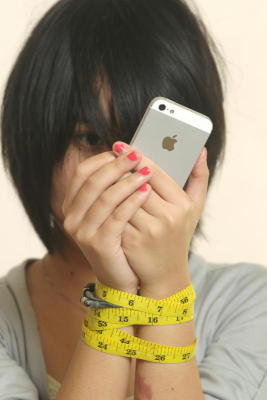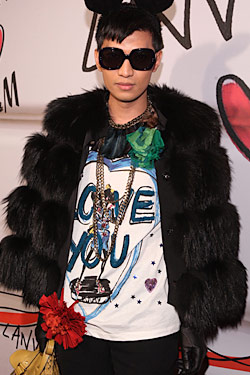By AMANDA SOO
alltherage@thestar.com.my
Is social media to blame for making girls more obsessed than ever with being thin?
TWO months ago, America’s Next Top Model judge and fashion blogger Bryanboy was accused of encouraging ‘thinspiration’ among his 350,000 followers when he tweeted “Mark your calendars kids! You have less than a month to lose weight and make those bones appear. Fashion month is just around the corner!”.
Bryanboy’s tweet is but one of the millions of messages bombarding the public about how thin is in.
It underscores how social media has become yet another medium – apart from television, film, magazines and music videos – to propagate this ideal body type, and pressure people into accepting that they should be underweight like models on the runway.
A platform for comparison
Some people have come to believe that many of the images in the traditional media have been photoshopped, so they are sometimes more sceptical.
“When it comes to social media such as Facebook, most believe that they are looking at raw pictures, or ‘real girls.’
Whether this is true or not, they are ultimately used as a standard of comparison,” said academician Mary Streech who researches and educates on eating disorder through Mary Streech Project.
Representation of individuals on social media is not always as real as some would like to believe it to be though.
A 23-year-old Malaysian lifestyle blogger and avid social media user, who wishes to remain anonymous, used to photoshop pictures of herself before posting them up on Facebook and her blog.
“I would erase the acne on my face and push in any bulges to appear slimmer in the photographs,” said the blogger. She believed that with so many friends being able to view the pictures, it was only natural to want to look one’s best on social networking sites. But because how she looked like on social media was different from who she really was, she would avoid leaving her house as much as she could.
“Of course, I had some haters who would comment on my pictures saying I was fatter in real life. It would shake my self-esteem, but it’s part of the price to pay for being a public figure on social media – to have people put you down,” she said.
Because images on social networking sites are mostly generated by users’ friends, acquaintances and other users who are ‘just like them’, people also feel pressured to keep up with the Joneses. “Research has shown that people tend to compare themselves with what others post online especially on sites like Facebook and Twitter,” said Dr Nivashinie Mohan, a neuro-psychologist from Gleneagles Hospital Kuala Lumpur.
“We normally post our best photos and check in at the latest spots and by doing so promote a certain image to our friends,” said Dr Nivashinie. “People looking from the outside find it easy to be envious when they perceive that their friends have better lives than them. This can lead to a lack of self esteem or in some cases a negative self image.”
“Fashion photos seen on Facebook and Pinterest make you go, ‘look at the gorgeous dress!’ And the girls wearing them are really skinny,” said 20-year-old accounting student Jasmine Chew. “That used to give me the idea that if I became as skinny as them, I could put on any clothes that I want. I would be able to wear gorgeous dress like the other girls could.”
Chew had battled with her weight since her secondary school years and was teased a lot for it.
Being constantly exposed to fashion images online only strengthened her belief that being anything other than skinny was unacceptable. “I thought that being fat was a sin, that if you were fat, you had no right to be pretty, to wear nice clothes or to feel pretty,” she said.
Because of that perception, Chew resorted to drastic dieting, allowing herself only two oranges and a cup of hot beverage daily for three weeks.
Skinny fit
In Israel, a University of Haifa study found that the more time adolescent girls spend on Facebook, the more they suffered conditions such as eating disorders and negative self-image.
Communication student Foo Jean-Ni, 21, used to suffer from anorexia nervosa, an eating disorder characterised by abnormal eating behaviour and an intense fear of gaining weight. Foo is still underweight, but said she is eating normally now. However, being on Facebook sometimes brings back her insecurities.
“Pictures of friends looking skinny just brings out that side of me that thinks I’m fat. It is a constant reminder that I have to be skinny to fit in.”
Grace Moo, 29, also used to be anorexic. When she was younger, she did competitive gymnastics, a sport that places a lot of emphasis on maintaining a slim physique. She was not particularly thin nor fat as a child, but she remembers feeling the pressure to lose weight if she wanted to get on the gymnastics team.
Being taunted by her classmates about her weight did nothing to ease the pressure.
At the age of 12, Moo went into a weight-loss diet that spiralled out of control into a cycle of anorexia and bulimia that lasted more than ten years.
“I only wanted to be thin — and I stumbled upon all these pro-anorexia websites and forums, which supplied many tips and tricks to make my ‘dreams’ come true,” she recalled.”
Now that I look back, those websites were a bondage to girls with eating disorders. When I was really ‘into’ those websites, I didn’t find anything bad about them, but they were really evil — like pornography. They suck you in and you find it very difficult to break from them.”
“When researchers try to identify how different factors contribute to an eating disorder, it was found that social media reinforces a negative self image,” said Dr Nivashinie. “It is a lot easier for people with eating disorders to find support as gratification by posting pictures of themselves and having friends ‘like’ the pictures or comment on how slim they look.
“Similarly, it’s easier to connect with others who have eating disorders, with the click of the mouse. This way, people with eating disorders find others with similar problems and share tips of weight loss, comment on how fat they look and motivate one another to keep losing weight.”
Deeper problems
Dr Nivashinie believes distorted body identity is caused by deeper reasons than exposure to social media.
“Genetics, brain chemistry, brain structure and the role of hormones are amongst some of the influencing factors. So are environmental and social factors,” she said, adding that in most cases of eating disorder, psychological help is required as the cause is varied.
Chew was fortunate because a friend noticed how little she was eating, and intervened.
“She helped me realise that I had some issues to deal with inside, not merely my body weight or body figure,” said Chew.
In Moo’s case, she was only able to finally get out of the vicious cycle after undergoing therapies, receiving encouragement from friends who prayed for her and helped her overcome her low self-image, and finding her faith in God.
“If I did not have the strength and life that my faith gave me, it wouldn’t have been possible. I wouldn’t even have wanted to get well,” said Moo.
While it contributed negatively to Moo’s preoccupation with wanting to be thin, social media had a positive influence in her recovery too. “When I finally wanted to recover from my eating disorders, I did find very helpful things on the Internet — especially through the blogs of recovering eating disorder sufferers,” said Moo.
It would seem that social media works both ways.






Tell us what you think!